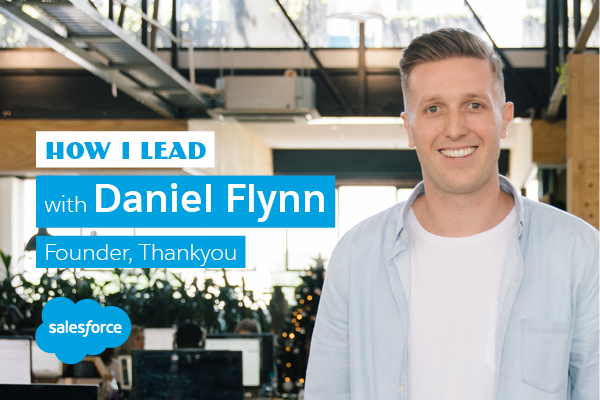Back in 2008, Daniel Flynn, his best mate Jarryd and his then-girlfriend (now wife) Justine launched Thankyou Water for the sole purpose of funding water projects in developing nations. At the time, they were uni students and didn’t have much business experience. What they did have was a drive to make a difference to the world.
A decade on, Thankyou Water has rebranded to Thankyou, and its range of food, personal care and baby care products are stocked in major supermarkets across Australia and New Zealand. In this guest post, Daniel recounts the highlights of the startup journey and shares his approach to leading a business through a period of massive growth.
Jarryd, Justine and I had a seriously tough startup journey – we were uni students with limited business experience, but we had loads of determination and that drove us to continue building the business, even through the tough times.
For the first three years we didn’t take salaries, we didn’t have investors, we didn’t have any money coming in from external sources. Partly because we didn’t know the norms of business, we did things the way we thought they should be done.

This had some great outcomes. At the start, we were outlandishly bold in asking Visy to partner with us and supply 10 million bottles a year for free. It grabbed their attention and they supplied us with 30,000 bottles! It also led to some fantastic mistakes.
At the start, I would have hated working for me – I saw every win as a stepping stone to a bigger goal, allowing no time to stop and celebrate great achievements.
But since the beginning, we had a hunger for innovation, a fearless beginner’s mindset and a willingness to hack our way in to the business world.
That attitude is what we’re trying hard to preserve in the business today. Of course, now that we’ve been in business for a decade, rebranded to Thankyou, launched new product lines, expanded internationally and experienced massive growth, it can be quite a challenge.
We have been singularly obsessed with great product and perfect execution. The business of Thankyou from the start was to uplift humanity, so we believe we have to do everything with the “painstaking excellence” that Dr. Martin Luther King Jr spoke of.
Encouraging that form of painstaking excellence while deeply valuing a pioneering spirit, or a beginner’s mindset, can be a difficult balance. It seems contradictory to celebrate failure while insisting on quality, and we haven’t always achieved that balance. But if you can manage such a balance in a business that has at its core a powerful culture of social justice, then I think that is the very definition of responsible leadership.

Responsible leadership
For me, responsible leadership is about authenticity and vulnerability. It’s acknowledging that, as a leader, I don’t have all the answers.
It’s important that I make it clear that I would like to tackle some of the great challenges that businesses face locally and globally, such as sustainability of supply chains, diversity in the workplace, diversity in thought, and in culture and religion. But it is also essential for me to admit that sometimes I don’t know where to start and that I am open to learning and listening.
When I say ‘listening’, a leader cannot simply listen to one point of view. We sometimes fall into a trap where we try to make decisions, perhaps around supply chain, after listening to just one point of view without truly understanding all of the other input. Responsible leadership is about looking at all the input, still being okay to make a mistake and learn our own lessons, then moving forward.
During this process, communication is key. When communication drops, people lose that motivation that comes with knowing exactly where the business is going and its goals.
When communication suffers, it also tends to mean that people in the business develop a fear of failure. They silo failure, meaning individuals and departments tend to hide their own failures from the rest of the business. The culture becomes only about perfection and success. This is a misstep, and it’s one that we have experienced at Thankyou in the past. Transparency and vulnerability are very powerful drivers of a great culture.

Sometimes we fail
Leading by example is extremely important to me. I have led projects that have been executed with that painstaking excellence we strive for, but which have also failed. We put so much energy into something and worked hard on it, and it just fell over.
When that happens, we need to be open about that. From those experiences I have taken learnings and continued to move forward.
I think that it’s important to be willing to go all-in, failing and learning, and doing plenty of stuff right, too!
That leads to the final piece of the puzzle – persistence. Everybody fails on the way to success, but if you’re not persistent then you’ll never make it past the first few failures.
For five years at Thankyou we worked to get our products into the big Australian supermarkets – we could have been failing to get our products on supermarket shelves, but those five years were amazing learning experiences for our business. Most importantly, we were persistent.
We took all of our learnings and finally created a campaign for Coles and Woolworths that was successful. We failed, learned, grew, applied learnings and finally succeeded. It was a very long five years!
Responsible leadership is about a beginner’s mindset and a fearless support of pioneering, an obsession with quality of product or service, great communication, authenticity and vulnerability, all combined with a powerful purpose.
It can be a difficult balance, but the rewards for getting it right are enormous.

















